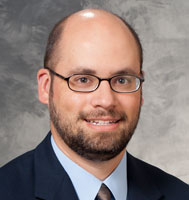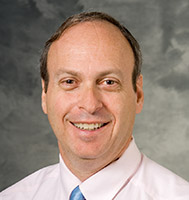
The new academic year will bring a change in leadership for the Division of Hematology, Oncology, and Bone Marrow Transplant when Christian Capitini, MD, associate professor, assumes the role of division chief on July 1. Capitini will lead the division and its nationally recognized clinical, research, and educational programs in pediatric cancer.
Capitini is a pediatric hematologist and oncologist who sees patients through the Pediatric Bone Marrow Transplant and Cellular Therapy program. An active member of the Carbone Cancer Center, Capitini leads an NIH-supported laboratory focusing on the development of cell-based immunotherapies, including natural killer (NK) cells and CAR T cells, for the treatment of pediatric solid tumors like neuroblastoma, osteosarcoma, and rhabdomyosarcoma. Capitini holds the Jean R. Finely Professorship in Pediatric Hematology and Oncology. He joined the Department of Pediatrics out of fellowship in 2011.
“I am excited to watch Dr. Capitini’s vision for our Division of Hematology, Oncology, and Bone Marrow Transplant unfold and mature,” said Megan Moreno, MD, MSEd, MPH, professor and interim chair of the Department of Pediatrics. “I have no doubt that Christian will encourage division faculty to build new, specialized research and treatment programs to regional and national acclaim while developing future pediatric cancer leaders through the Hematology and Oncology Fellowship.”

This leadership transition comes after a decision from Kenneth DeSantes, MD, professor, to step down as division chief, a role he has held since 2016. DeSantes will continue on the faculty and turn his focus to clinical research while serving as interim director of Bone Marrow Transplant and Cellular Therapy.
DeSantes joined the Department of Pediatrics in 1998, bringing with him expertise in bone marrow transplant and a special interest in neuroblastoma. In 2006, he established American Family Children’s Hospital as an 131I-MIBG treatment center, one of only 12 such centers in the U.S. at the time. His expertise in delivering molecular targeted radiotherapeutic agents helped the UW team develop a new way of treating neuroblastoma that combines 131I-MIBG with immunotherapy. In 2020, the UW became the first and only U.S. site for an international clinical trial testing this combo therapy.
“Through 25 years of forward-thinking and planning, Ken has made the University of Wisconsin a destination center for the treatment of neuroblastoma,” Capitini said. “As chief, he brought that foresight to the division and greatly expanded our clinical trial portfolio, not only through our membership in the international consortium Children’s Oncology Group but also by encouraging faculty in the division to lead investigator-initiated trials.”
Capitini credits DeSantes with supporting his own research program in CAR T cells. American Family Children’s Hospital/UW Carbone Cancer Center was the first site in Wisconsin to offer CAR T cell therapy — for children and adults — in clinical trials.
Capitini expects DeSantes’s influence as chief to continue for years, due in part to his ambitious — what Capitini calls “perhaps record-breaking” — hiring. DeSantes hired six of the division’s 10 faculty members, and he launched a search for a seventh earlier this month. “Faculty in the Department of Pediatrics tend to stay here,” Capitini explained, “and these are people who could have impact for decades.”
While recognizing the accomplishments of division leadership that came before him, Capitini has developed goals for his role as chief that are ambitious and uniquely his own. “I want to take our division to a new level and, among other things, become a destination center for pediatric cancer, as well as blood disorders, both regionally and nationally,” he said.
He identified three paths through which he plans to achieve these goals. The first is to build the division’s research footprint, both in the lab and in clinical research, related to cell and gene therapy including CAR T cells. Second, he intends to foster partnerships with other departments within the UW School of Medicine and Public Health to develop clinical care programs of distinction in new and developing areas, including Birthmarks and Vascular Anomalies, Theranostics, and Neuro–Oncology and Neurocutaneous disorders. And third, recognizing a need to better support adolescents and young adult cancer survivors through their transition from pediatric care to adult care, Capitini wants to develop a program that carefully coordinates these transitions not only for cancer patients but also for children with blood disorders like sickle cell disease.
“I’m excited for the opportunity to work with an incredible team as we embark on this exciting new chapter full of possibilities,” Capitini said.